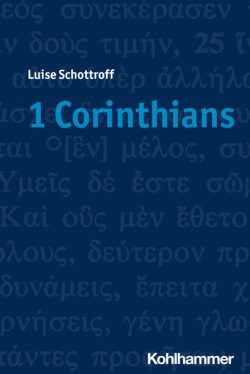Описание книги
The English version is based on the German 2nd edition. It was translated by Everett R. Kalin, Professor Emeritus for New Testament at Pacific Lutheran Theological Seminary at Berkely/CA.

Реклама. ООО «ЛитРес», ИНН: 7719571260.
Content
Foreword to the Second Edition
1. Social History
2. Christian-Jewish Dialogue
3. Feminist Exegesis
Foreword
Introduction: Who was Paul?
1. Paul the Jew
2. Paul and the Messiah
3. Paul among his Brothers and Sisters
4. Everyday Life in the Cities of the Roman Empire
5. Paul the Mystic
Commentary. The Date of the Letter and the City of Corinth. The Date of the Letter
The Congregation’s Location: Corinth
1:1–9
1:1–2
1:4–9
Concepts of Time and Eschatology
1:10–18
1:14–17
The Wisdom of this World
Denial of the Crucifixion
1:19–25
1:19–20
Believers in the Messiah from the Nations and their Identity
1:26–31
2:1–16
2:1–5
The »We« of the Congregation
2:6–16
3:1–23
3:1–4
3:5–11
3:12–17
3:18–23
4:1–13
4:1–5
4:6–13
4:14–21
5:1–13
5:1–5
5:6–8
5:9–13
6:1–11
6:9–11
6:12–20
Images from Slavery to Represent God’s Act of Liberation
7:1–40
7:1–7
The Social Practice of Contemptuous Sexuality (porneia)
7:3–5
7:8–11
Divorces
7:12–16
7:17–24
Slavery
The Torah in 1 Corinthians
7:25–38
7:39–40
8:1–11:1
8:1–13
8:1
Sacrificial Meat—Meat Consumption
9:1–27
9:1–3
9:4–6
Pay for the Teaching of the Torah
9:7–11
9:12–14
9:15–18
9:19–23
Sin and Torah in 1 Corinthians
9:24–27
Sports Competitions
Thoughts of a Woman from a Future Generation
10:1–11:1
10:1–13
10:14–22
Paul’s Theology of the Body523
10:23–11:1
11:2–16
11:2–6
11:7–15
11:16
11:17–34
11:17–22
The Congregational Gathering
11:23–26
»For you.« Martyrdom or Sacrifice?
»Do this in remembrance of me«
11:27–34
12:1–31
12:1–3
12:4–11
12:4–7
12:8–10
12:12–27
Body of Christ: You are the body of the Messiah (12:27)
12:28–31
13:1–13
13:1–3
13:4–7
13:8–13
14:1–40
14:1–5
To Speak with God in one’s Native Language (lalein glōssais/to Speak in Languages)
14:6–19
14:20–25
14:21–25
14:26–33
14:34–38
14:39–40
Resurrection Hope in the Context of the Roman Empire (15:1–19) The Starting Point
The Perspective on the Present Life and the Goal of the Text, 1 Corinthians 15
Sociohistorical Orientation
Jesus’ Answer to the Denial of the Resurrection in Matt 22:23–33 and the Answer of Paul in 1 Corinthians 15
15:1–2
15:3–11
Appearances of the Risen One, 1 Cor 15:5–8
15:12–19
15:20–22
15:23–28
15:29–34
15:30–32
15:35–38
15:39–41
15:42–44
15:45–50
15:51–53
15:54–58
16:1–24
16:1–4
The Gifts of the Nations for Jerusalem
16:5–9
16:10–14
16:15–18
16:19–24
List of Abbreviations
Bibliography
Selective Index. I. Old Testament (including the Apocrypha) Genesis
Exodus
Leviticus
Numbers
Deuteronomy
1 Samuel
2 Maccabeans
Job
Psalms
Proverbs
Wisdom
Sirach
Isaiah
Jeremiah
Ezekiel
Daniel
Hosea
Amos
Malachi
Prayer of Azariah
II. New Testament (excluding 1 Corinthians) Matthew
Mark
Luke
John
Acts
Romans
2 Corinthians
Galatians
Ephesians
Philippians
1 Thessalonians
1 Timothy
Hebrews
James
1 Peter
Jude
Revelation
III. Intertestamental and post-biblical Judaism
IV. Early Christian Literature
V. Non-Jewish and non-Christian Ancient Authors
Luise Schottroff
1 Corinthians
.....
To be sure, the »Jewish sects« in 19 CE are not to be correlated with groups acclaiming Jesus as Messiah, but the religio-political and legal presuppositions with which the congregation in Corinth had to reckon show themselves here.
In 1:18 Paul must do battle with people within the congregation in Corinth who consider it to be mōria/foolishness, idiocy, imprudence to be in solidarity with Jesus’ crucifixion and, thereby, also with crucifixions. The pressure was so great that again and again people denied that they belonged to Jesus (aparneō or arneō, for example Matt 26:34, 70). Another Greek word for this is skandalidzō/to take offense. In the figure of Peter, the Synoptic Gospels have established an empathic monument to this shocking danger of solidarity with Jesus and with one another. Peter had betrayed Jesus, though he had not wanted to do so. His fear was too great (Mark 14:66–72 and parallels). This account was written and handed on long after Jesus’ death, not because Peter should be remembered as a weak character, but because it evokes courage that he succumbed to his fear and then, in spite of that, stood up again and was found to be at the side of the Risen One. The danger posed by political pressure plays a significant role in the gospels; see the flight of all the disciples after Jesus’ arrest (Mark 14:50) or also Mark 4:17; Mark 8:34–38 and parallels. These traditions are not recounted with the conviction, »This can’t happen to us.« Those involved knew that the fear of brutal executions and persecution was not some remote possibility. When Paul did battle with people in the Corinthian congregation who found it foolish or imprudent to hold up the Risen One for all to see as the one who had been crucified, he didn’t have in mind »opponents« or heretics who believed something different from what he believed, but instead people who asked whether fellowship with the Messiah was possible without political peril.
.....